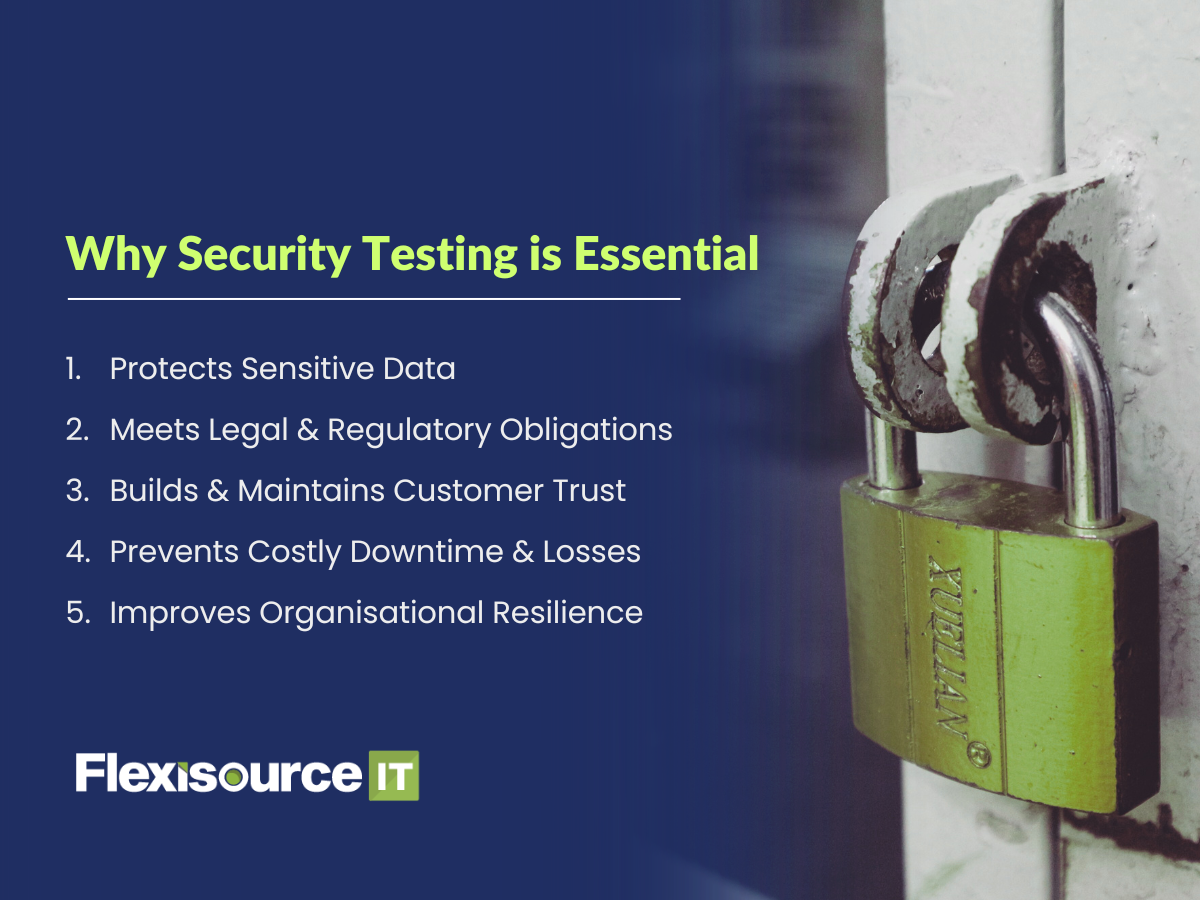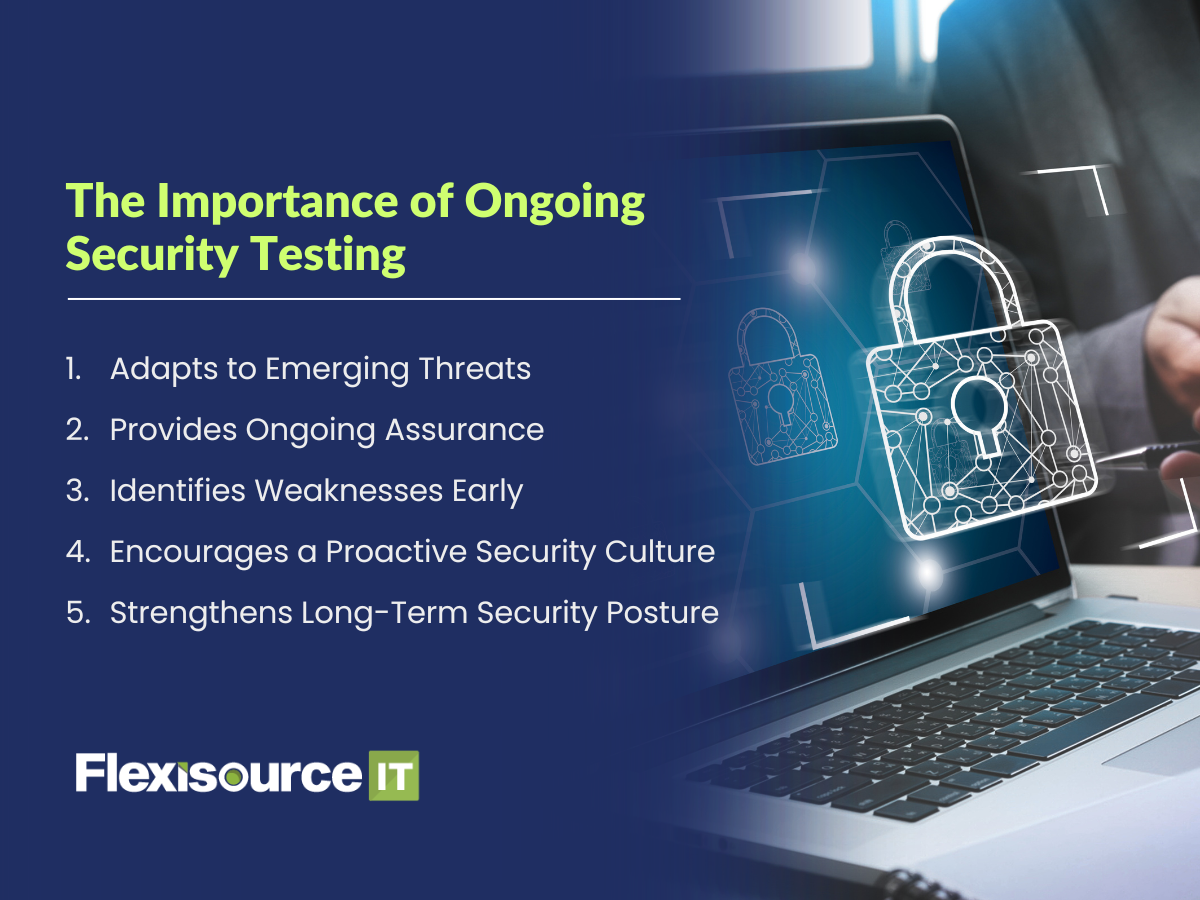In today’s digital age, businesses are increasingly reliant on technology to manage operations, store data, and serve customers. With this heavy reliance comes a growing risk—cyber threats. From data breaches to ransomware attacks, the potential dangers are real and costly. This is where security testing plays a vital role in safeguarding systems, data, and reputations.
Whether you’re a startup looking to scale or a well-established enterprise, investing in robust security testing helps protect your systems, preserve customer trust, meet legal requirements, and ensure your business can continue to thrive in the face of growing cyber risks.
What is Security Testing?
Security testing refers to a comprehensive set of practices designed to identify vulnerabilities, weaknesses, and security flaws within your digital infrastructure—including software, applications, networks, databases, and internal systems. The aim is to proactively uncover and fix potential entry points before they can be exploited by malicious actors.
Some of the most common types of security testing include:
- Vulnerability Scanning: Uses automated tools to search for known security issues and configuration errors across systems.
- Penetration Testing (Pen Testing): Simulated attacks performed by ethical hackers to identify real-world vulnerabilities that could be exploited.
- Security Audits: Formal reviews of your IT environment, policies, and procedures to ensure they align with security standards and best practices.
- Risk Assessments: Evaluates the likelihood and impact of potential threats, helping prioritise resources and security improvements.
- Ethical Hacking: Engages white-hat hackers to mimic criminal behaviour in a legal and controlled way, revealing flaws from a hacker’s perspective.
Why Security Testing is Essential
Security testing helps identify vulnerabilities early, protecting sensitive data, ensuring compliance, and preventing costly disruptions. It builds trust with customers and strengthens your organisation’s resilience against cyber threats.

Protects Sensitive Data
Whether it’s customer records, employee information, financial details, or intellectual property, your business holds valuable data that must be safeguarded. A single data breach can cause irreversible damage to your brand and result in significant financial and legal consequences. Security testing helps ensure data is properly encrypted, access is restricted, and systems are secure against unauthorised intrusions.
Meets Legal & Regulatory Obligations
Australian businesses are required to comply with a range of privacy and data protection regulations, such as the “Privacy Act 1988” and the Notifiable Data Breaches (NDB) scheme. International standards like General Data Protection Regulation (GDPR) may also apply if your organisation handles overseas data. Regular security testing demonstrates compliance and reduces the risk of regulatory fines and reputational damage.
Builds & Maintains Customer Trust
Today’s consumers are more privacy-conscious than ever. They want to know their personal data is handled responsibly and securely. By regularly testing your systems for vulnerabilities, you signal a commitment to data protection, helping you build stronger relationships with customers, partners, and stakeholders.
Prevents Costly Downtime & Losses
Cyberattacks can shut down operations, corrupt or destroy data, and demand large ransom payments. Recovery can take days, or even weeks—depending on the severity. Proactive security testing uncovers weaknesses before attackers do, minimising the likelihood of disruption and the costs associated with it.
Improves Organisational Resilience
A strong security posture isn’t just about defence—it’s about resilience. When vulnerabilities are detected early and addressed promptly, your systems are better equipped to handle threats without compromising performance or reliability. Security testing helps keep your operations running smoothly, even under pressure.
The Importance of Ongoing Security Testing
Regular security testing is essential to ensure your organisation remains prepared to defend against emerging and evolving cyber threats. By making security testing an ongoing part of your operations, you can stay one step ahead of attackers and keep your systems, data, and reputation secure.

Adapts to Emerging Threats
Cyber threats are constantly evolving, with new vulnerabilities and attack techniques emerging regularly. Ongoing security testing helps you adapt quickly, and AI-powered cybersecurity solutions can further enhance your resilience, providing real-time protection against these ever-changing risks.
Provides Ongoing Assurance
Frequent security testing provides continuous assurance that your organisation’s security measures are up to date and functioning as intended. By regularly assessing your systems, you ensure they are fortified against potential vulnerabilities, giving you peace of mind and reducing the likelihood of undetected issues that could lead to security breaches.
Identifies Weaknesses Early
Regular testing helps identify weaknesses early in the development or operational lifecycle, enabling you to fix vulnerabilities before they become critical. Addressing these weaknesses at an early stage prevents the escalation of security risks and reduces the overall impact on your organisation. Early detection and resolution are key to minimising the chances of a successful attack.
Encourages a Proactive Security Culture
Making security testing a continuous part of your operations fosters a proactive security culture within your organisation. It encourages employees to think ahead, be vigilant, and actively participate in safeguarding systems and data. By embedding security into everyday processes, you create a culture of awareness, where everyone is actively engaged in maintaining the security of your organisation.
Strengthens Long-Term Security Posture
Regular security testing helps your organisation build a strong, long-term security posture. As vulnerabilities are identified and addressed, your security systems become more robust over time. This continuous improvement ensures that your defences remain resilient, scalable, and capable of protecting your organisation from future risks, even as cyber threats evolve.
Best Practices for Effective Security Testing
Integrating security testing early in the development process, using both automated and manual tools, and keeping systems updated are key to strengthening your organisation’s security. Continuous testing and employee training further enhance your ability to identify and address evolving threats.

Shift Left in Development
Incorporate security testing early in the software development lifecycle. This “shift-left” approach helps identify vulnerabilities before they become costly issues. It promotes a proactive mindset across development and operations teams.
Combine Manual & Automated Tools
Use automated tools for quick, consistent scanning of common vulnerabilities. Complement this with manual testing like penetration tests for deeper, context-aware insights. The combination offers broader and more accurate coverage.
Stay Updated with Patches & Fixes
Regularly update your systems, software, and plugins to close known security gaps. Unpatched vulnerabilities are common entry points for attackers. A structured patch management process reduces your exposure to threats.
Educate & Empower Your Team
Employees are often the first line of defence against cyber threats. Provide ongoing training to help them identify risks such as phishing attacks or social engineering. A well-informed team strengthens your overall security posture.
Perform Continuous & Adaptive Testing
Treat security testing as an ongoing activity, not a one-time task. Run regular scans and adjust testing based on new threats and system changes. This keeps your defences resilient and responsive over time.
Conclusion
Security testing is crucial for protecting your organisation from the growing threat of cyberattacks. With regular, ongoing testing, you can identify vulnerabilities before they turn into serious risks, ensuring your systems remain strong and your data secure. By making security a top priority, you’re not just meeting compliance standards—you’re building long-term resilience and earning the trust of your customers. Stay ahead of cyber threats, strengthen your defences, and keep your business secure for the future.
Ready to secure your business against cyber threats? Contact Flexisource IT and start your security testing today!







